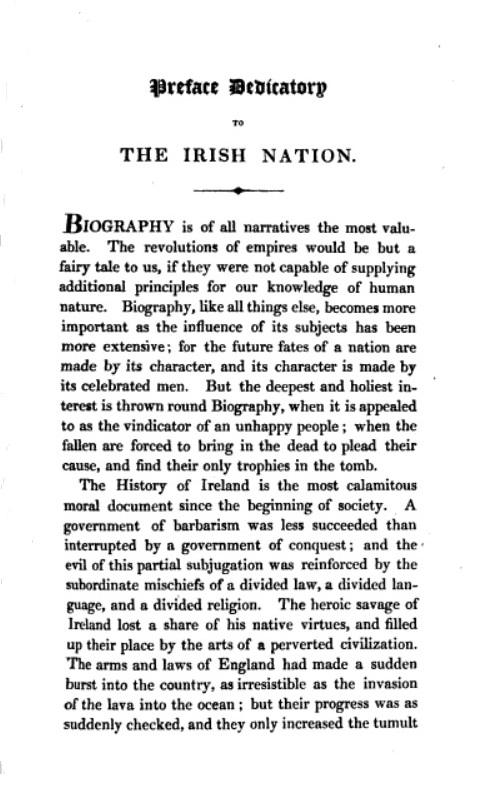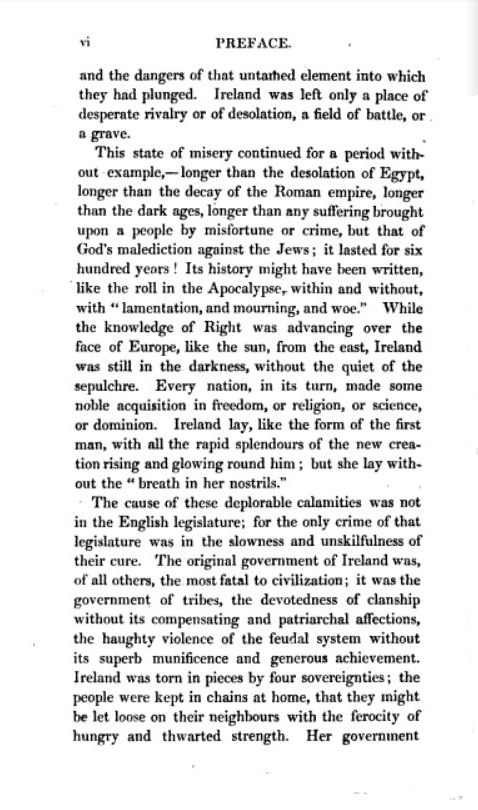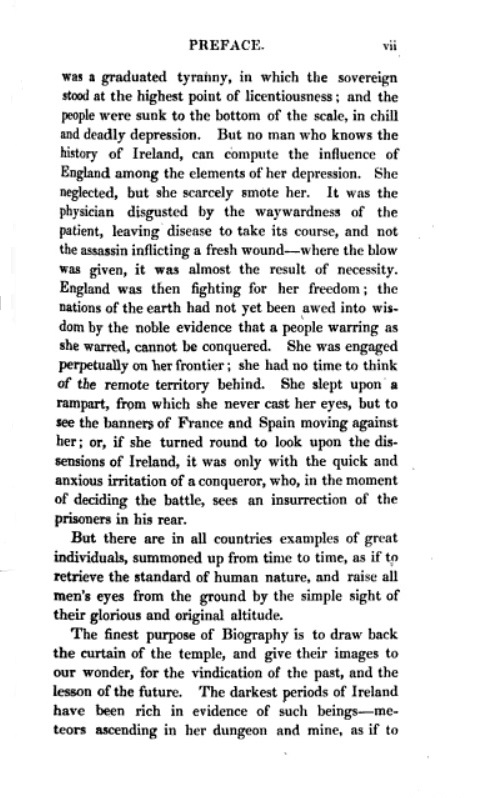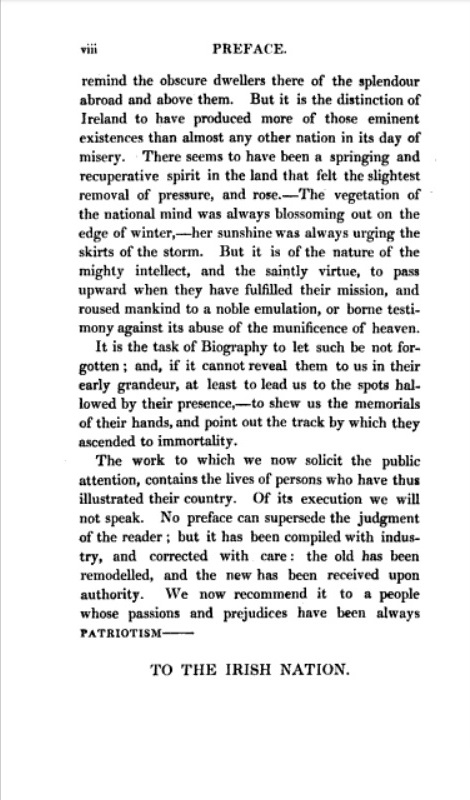|
Richard Ryan, Biographia Hibernica: A Biographical Dictionary of the Worthies of Ireland, 2 vols. (1819-21)
| Internet availability ... |
Copies of Biographia Hibernia, Vol. 1 (1819), can be read on page-image format at Internet Archive - online; ditto Vol. 2 (1821) - online; both accessed 29.09.2023). |
| Copy of the 1819 Edition (London: Richard Ryan; Dublin: M.N. Mahon), Vol. 1, available at Google has a preface dedicatory to the Irish Nation [online; accessed 05.07.2023] |
A copy of 1821 Edition held in New York Public Library {NYPL] is available at Internet Archive - online.
A copy of the 1822 Edn. held in Wisconsin Univ. Library is available on Interrnet- online. |
| See also rough text-cop of Vol. II in RICORSO > Library > Classics - Word [.docx] or Adobe [.pdf] |
|
| Bibliographical details: Richard Ryan, Biographia Hibernica: A Biographical Dictionary of the Worthies of Ireland, 2 vols. [1819-21] from the earliest period to the present time. Written and compiled by Richard Ryan in two volumes / Printed for Sherwood, Neely & Jones, Paternoster Row; M. N. Mahon; R. Milliken; and Hodges & MacArthur / Dublin 1822. Printed by J. Brettell Rupert Street, Haymarket, London. The Epigraph printed on the title page is the second stanza of Moore’s song, “Let Erin Remember the Days of Old” - thus: |
“On Lough Neagh’s bank, as the fisherman strays / In the calm, cold eve’s declining, / He sees the Round Towers of other days / In the wave beneath him shining. / Thus shall memory often, in dreams sublime, / Catch a glimpse of the days that are over; / Thus, sighing, look through the waves of time / For the long-faded glories they cover.” |
| Note: the first edition (1821) and also the second (1822) - but the 1819 edition has a "Preface Dedicatory to the Irish Nation" which was revived in the 1822 (3rd) and omitted from the 1821 edition. |
| Preface Dedicatory to the Irish Nation (1822 Edn.) |
| Note: The Dedicatory Preface is omitted from the 1821 edition and restored in the edition of 1822 Edition |
Biography is of all narratives the most valuable. The revolution of empires would be but a fairy tale to us, if they were not capable of supplying additional principles for our knowledge of human nature. Biography, like all things else, becomes more impoarant as the influence of its subjects has been more extensive; for the future fares of a nation are made by its character, and its character is made by its celebrated me. But the deepest and holiest interest is thrown round Biography, when it is appealed to as the vindicator of an unhappy people; when the fallen are forced to bring in the dead to plead their cause, and find their only trophies in the tomb.
The History of Ireland is the most calamitous moral document since the beginning of society. A goverment of barbarism was less succeeded than interrupted by a government of conquest; and the evil of this partial subjugation was reinforced by the subordinate mischiefs of a divided law, a divided language, and divided religions. The heroic savage of Ireland lost a share of his native virtues and filled up their place by the arts of a perverted civilisation. The laws of English had made a sudden burst into the country ... but their progress was as suddenly checked, and they only increased the tumult and dangers of that untamed element into which they had plunged. Ireland was left only a place of desperate rivalry or of desolation, a field of battle or a grave.
The cause of these deplorable calamities was not in the English legislature; for the only crime of that legislature was in the slowness and unskillfulness of the cure. The original government of Ireland was, of all others, the most fatal to civilisation; it was the government of tribes, the devotedness of clanship without its compensating and patriarchal affections, the haughty violence of the feudal system without its superb munificence and generous achievement. Ireland was torn in pieces by four sovereignties; the people were kept in chains at home, that they might be loosed on their neighbours with the ferocity of hungry and thwarted strength. Her government was a graduated tyranny in which the sovereign stood at the highest point of licentiousness; and the people were sunk to the bottom of the scale in chill and deadly depression. But no man who knows the history of Ireland can compute the influence of England among the elements of her depression. She neglected, but she scarcely smote her. It was the physiciants disgusted by the waywardness of the patient, leaving the disease to take its course, and not the assassin inflicting a fresh wound. ... England was then fighting for her freedom [against] France ... Spain ... if she turned round to look upon the dissensions of Ireland, it was only with the quick and anxious irritation of a conqueror, who in the moment of deciding the battle, sees an insurrection of prisoners in the rear.
[...]
|
(Available at Google - online - accessed 02.07.2023; see See page-images of Preface in full - as infra; full-text copies available in RICORSO Library > Criticism - as .pdf & .docx.)
|
| |
| [Contents by Persons Included] |
| Vol. 1 (1819) |
|
|
Abernethy, John
|
|
Burke, Richard
|
Archdekin, Richard
|
|
Cantwell, Andrew
|
Barber, Mary
|
|
Carolan, Turlough
|
Barry, David
|
|
Centlivre, Susannah
|
Barry, Spranger
|
|
Cherry, Andrew
|
Berkeley, George
|
|
Clancy, Michael
|
Borlase, Edmund
|
|
Clayton, Robert
|
Boyd, Hugh Macauley
|
|
Cleiri, or Cleirigh, Michael
|
Boyle, Henry [Earl of Shannon]
|
|
Colgan, John
|
Boyle, Richard [Ist Earl of Cork]
|
|
Columbanus
|
Boyle, Robert [Hon.]
|
|
|
Boyle, Roger [Earl of Orrery]
|
|
|
Boyse, Samuel
|
|
|
Brady, Nicholas
|
|
|
Brooke, Charlotte
|
|
|
Brooke, Henry
|
|
|
Browne, Peter [Bishop of Cork]
|
|
|
Burgh, Walter Hussey
|
|
|
Burke, Edmund
|
|
|
| Vol II (1821) |
|
|
Concanen, Matthew [commencing Vol. II 1819 Edn.[
|
|
MacGeoghegan, Conall
|
Conry, Maurice [Flaithrí Ó Maolchonaire]
|
|
Macklin, Charles
|
Coote, Sir Charles
|
|
Malone, Edmund
|
Coote, Sir Charles
|
|
Millikin, Richard Alfred
|
Cox, Richard [Sir]
|
|
Molesworth, Robert
|
Curran, John Philpot
|
|
Molloy, Charles
|
Daniel, William
|
|
Molyneux, William
|
Delacour, James [Rev.]
|
|
Monk, Mrs.
|
Delany, Patrick
|
|
Mossop, Henry
|
Farquhar, George
|
|
Mossop, William
|
Fitzgerald, Edward
|
|
Murphy, Arthur
|
Fleming, Patrick
|
|
Nary, Cornelius
|
Flood, Henry
|
|
O’Brien, William
|
Francis, Philip [Sir]
|
|
O’Flaherty, Roderic[k]
|
Gentleman, Francis
|
|
O’Halloran, Sylvester
|
Goldsmith, Oliver
|
|
O’Hara, Kane
|
Grattan, Henry
|
|
O’Leary, Arthur [Fr.]
|
Grierson, Constantia
|
|
Ormond, Duke of,
|
Grimshaw, Nicholas
|
|
Parnell, Thomas
|
Haliday, William
|
|
Patrick, St.
|
Hamilton, Anthony
|
|
Pilon, Frederick
|
Hamilton, Elizabeth
|
|
Pockridge, Richard
|
Hamilton, William [Rev]
|
|
Roche, Boyle [Sir]
|
Hely-Hutchinson, John
|
|
Sarsfield, Patrick
|
Hiffernan, Paul
|
|
Sheridan, Frances
|
Hone, Nathaniel
|
|
Sheridan, R[ichard] B[rinsley]
|
Hutcheson, Francis
|
|
Thomas Sheridan
|
Jephson, Robert
|
|
Skelton, Philip
|
Johnstone, Charles
|
|
Sloane, Hans
|
Jones, Henry
|
|
Southerne, Thomas
|
Keating, Geoffrey
|
|
Sterne, Laurence
|
Kelly, Hugh
|
|
Swift, Jonathan
|
Keogh, John [d.1817]
|
|
Synge, Edward [Archbishop]
|
King, William [Archbishop]
|
|
Tate, Nahum
|
Kirwan, Richard
|
|
Touchet, James, Earl of Castlehaven
|
Langrishe, Hercules [Sir ]
|
|
Tyrrel, Richard
|
Le Fanu, Alicia
|
|
Ussher, James
|
Leland, Thomas
|
|
Wilk[e]s, Robert
|
Lombard, Peter
|
|
Woffington, Peg
|
Lucas, Charles
|
|
Harris, Walter [Addendum]
|
Macartney, George [Earl of]
|
|
|
Preface (1819 & 1822 Edns.)
 |
 |
 |
 |
| Available at Google Books - online; accessed 05.07.2023.] |
| |
|



